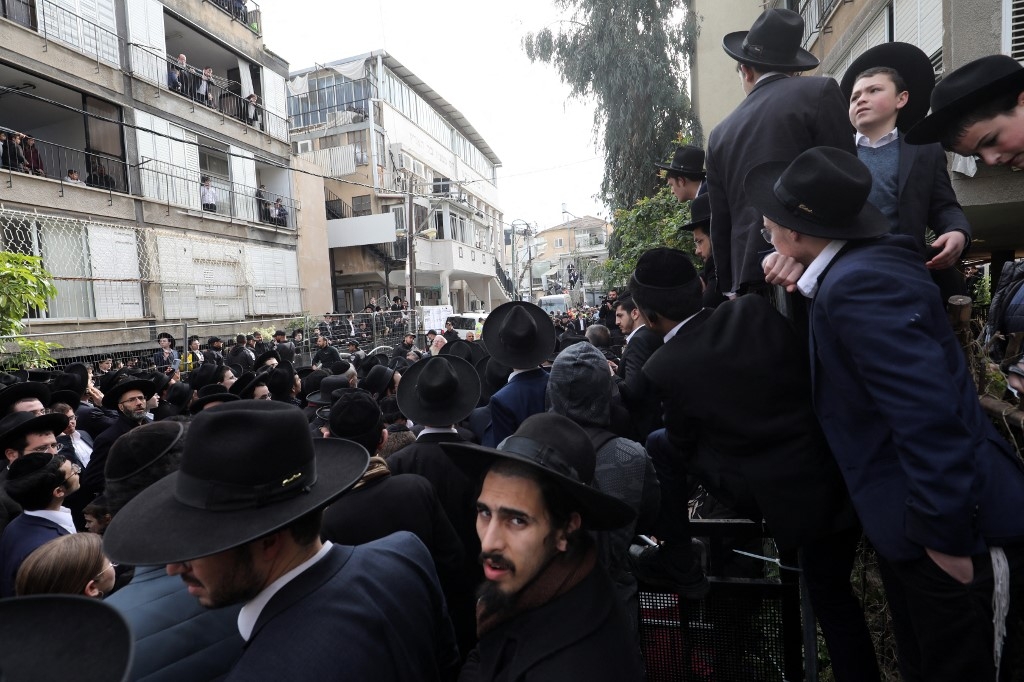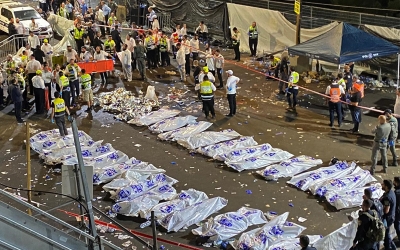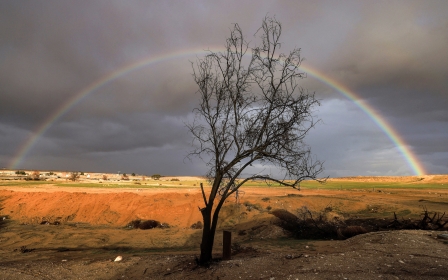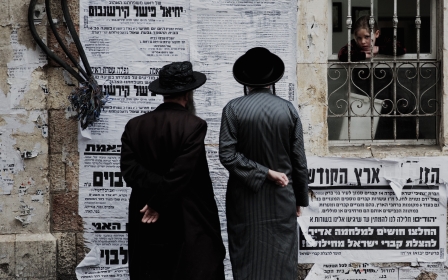Israel: Crowds gather for funeral of ultra-Orthodox rabbi known as 'Prince of Torah'

Hundreds of thousands of ultra-Orthodox Jews have gathered for the funeral on Sunday in Israel of influential rabbi Chaim Kanievsky, known to followers as the "Prince of Torah", with authorities warning of dangers from mass overcrowding.
Born in the Belarussian city of Pinsk, Kanievsky died on Friday aged 94 and was to be buried at midday local time in the mainly ultra-Orthodox city of Bnei Brak, near Tel Aviv.
New MEE newsletter: Jerusalem Dispatch
Sign up to get the latest insights and analysis on Israel-Palestine, alongside Turkey Unpacked and other MEE newsletters
The funeral, for which thousands of police and paramilitary officers, as well as volunteers, have been deployed to provide security, comes 11 months after a disaster at Mount Meron, an ultra-Orthodox pilgrimage site where 45 people died in a stampede.
Prime Minister Naftali Bennett said that "Rabbi Kanievsky's name will be remembered as an important part of the history of Torah and of the people of Israel," but also called on the attendees to avoid overcrowding: "The trauma of the Meron disaster is still fresh in all of us, this tragedy must not be repeated."
The Magen David Adom (MDA), Israel's equivalent of the Red Cross, said the funeral could be one of the largest gatherings in "Israeli history" and that hundreds of paramedics and other first responders were in place, according to AFP.
The MDA said it was "prepared for any mass casualty event".
Police closed off highways around Bnei Brak to regular traffic hours before the funeral to accommodate fleets of buses ferrying mourners to the city.
A senior police officer said that while some Israeli media predicted that up to one million people would flock to the funeral, police had deployed in accordance with the force's own estimate that crowds would be about half of that, Reuters reported.
Unifying figure
Kanievsky was the de facto head of what is commonly called the Lithuanian branch of ultra-Orthodox Judaism, and his knowledge of Jewish law was so revered that his rulings were thought to require total compliance within his community.
To some followers, he was known as "our master, the Prince of Torah", comprising the religion's laws and traditions.
Israel's ultra-Orthodox Jews, or haredim, are split among various factions and groups, but Kanievsky was seen by some as a unifying figure.
Aryeh Deri, a political leader and rabbi from the Sephardic haredi group - which has its roots in southern Europe and North Africa, rather than the Middle East - said Kanievsky transcended "definition".
He "was my rabbi", Deri told Israel's public Channel 11 television on Saturday.
Despite his prominence, Kanievsky lived in a modest Bnei Brak apartment, where religious texts lined the walls of a small study.
His notoriety within Israel and abroad surged in 2020 when he was accused of encouraging followers to ignore social distancing restrictions and continue gathering to study Torah.
A Jerusalem Post op-ed accused Kanievsky of committing an act of "civil disobedience" unprecedented in Israel's history, at a time when the rest of the Jewish state was required to isolate.
Widespread resistance among some haredim to respect restrictions, including orders to close schools and houses of worship, fostered deep resentment among mainstream Israeli society.
Yaakov Kanievsky, the rabbi's grandson and top adviser, told AFP at the time that the rabbi had not been not seeking to appear "defiant" in response to Covid lockdown rules.
But he stressed that for a prominent haredi rabbi like Kanievsky, limiting viral transmission could not be the main consideration.
"For the rabbi, the most important thing in the world is the study of Torah. Without that, there is no point to anything," Yaakov Kanievsky told AFP in November 2020.
"The rabbi believes that the Jewish people have no existence without Torah. You can't separate the two, you must study."
Middle East Eye delivers independent and unrivalled coverage and analysis of the Middle East, North Africa and beyond. To learn more about republishing this content and the associated fees, please fill out this form. More about MEE can be found here.






